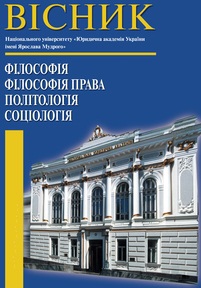ЛОГІЧНІ АСПЕКТИ ЮРИДИЧНОЇ ГЕРМЕНЕВТИКИ
LOGICAL ASPECTS OF LEGAL HERMENEUTICS
Author(s): Olena Mykolaivna YurkevychSubject(s): Logic, Hermeneutics, Philosophy of Law
Published by: Національний юридичний університет імені Ярослава Мудрого
Keywords: legal hermeneutics; interpretation of law; legal interpretation; logical method of interpretation; formal logic; hermeneutic logic;
Summary/Abstract: Problem setting. The generally accepted need for interpretation and interpretation is associated with the problem of ambiguity in the use of language systems. The task of interpretation and interpretation is to clarify the content of the subject of thought, which in some way corresponds to the object. Of particular significance today is the problem of understanding and rationalizing the ways to achieve it in the law with the use of logical knowledge, awareness of the social consequences of the results of legal interpretation and legal interpretation.Recent research and publications analysis. The logical aspects of legal hermeneutics, in particular, the logical mode of interpretation, have been incorporated into the history of legal hermeneutics from the outset and continue to evolve in the theory of law, to find their embodiment in modern hermeneutics and new legal sciences, such as legal technology. Among modern logical and legal studies it is necessary to note the works of E. V. Buligin, works on the methodology of law R. Tsipelius, domestic researchers on the issues of legal hermeneutics P. M. Rabinovich, hermeneutic logic O. M. Yurkevych, and others.Paper objective. The purpose of the article is to explore the logical foundations of legal hermeneutics.Paper main body. Legal hermeneutics is a system of rules for the interpretation of laws. A literal interpretation is carried out in order to establish the general meaning of the legal text containing the normative provisions. "Spirit" is not subject to literal interpretation. In the Anglo-American system, they are referred to as "originality" and "nonoriginalism". In legal hermeneutics, different ways of interpretation are distinguished: grammatical, special legal, logical, systematic, historical, evolutionary, and teleological. Legal hermeneutics refers to so-called "dogmatic" hermeneutics. Logical interpretation involves clarifying the structure of logical forms of thought, establishing their correctness according to the criteria of truth. A systematic interpretation is an analogue of a contextual approach. Historical interpretation is carried out using etymological analysis. The interpretation of the rules of law can be formal and informal. The principle of logic is one of the general principles of the interpretation of the law. The logical method of interpretation is most often used in cases where it is not possible to understand the unfortunate grammatical form when conflicts are found between individual norms, etc. Hermeneutical logic is used, if necessary, for additional explanatory procedures - interpretation and interpretation.Problem setting. The generally accepted need for interpretation and interpretation is associated with the problem of ambiguity in the use of language systems. The task of interpretation and interpretation is to clarify the content of the subject of thought, which in some way corresponds to the object. Of particular significance today is the problem of understanding and rationalizing the ways to achieve it in the law with the use of logical knowledge, awareness of the social consequences of the results of legal interpretation and legal interpretation.Recent research and publications analysis. The logical aspects of legal hermeneutics, in particular, the logical mode of interpretation, have been incorporated into the history of legal hermeneutics from the outset and continue to evolve in the theory of law, to find their embodiment in modern hermeneutics and new legal sciences, such as legal technology. Among modern logical and legal studies it is necessary to note the works of E. V. Buligin, works on the methodology of law R. Tsipelius, domestic researchers on the issues of legal hermeneutics P. M. Rabinovich, hermeneutic logic O. M. Yurkevych, and others.Paper objective. The purpose of the article is to explore the logical foundations of legal hermeneutics.Paper main body. Legal hermeneutics is a system of rules for the interpretation of laws. A literal interpretation is carried out in order to establish the general meaning of the legal text containing the normative provisions. "Spirit" is not subject to literal interpretation. In the Anglo-American system, they are referred to as "originality" and "nonoriginalism". In legal hermeneutics, different ways of interpretation are distinguished: grammatical, special legal, logical, systematic, historical, evolutionary, and teleological. Legal hermeneutics refers to so-called "dogmatic" hermeneutics. Logical interpretation involves clarifying the structure of logical forms of thought, establishing their correctness according to the criteria of truth. A systematic interpretation is an analogue of a contextual approach. Historical interpretation is carried out using etymological analysis. The interpretation of the rules of law can be formal and informal. The principle of logic is one of the general principles of the interpretation of the law. The logical method of interpretation is most often used in cases where it is not possible to understand the unfortunate grammatical form when conflicts are found between individual norms, etc. Hermeneutical logic is used, if necessary, for additional explanatory procedures - interpretation and interpretation.Conclusions of the research. Results: the definition of a set of logical tools that is used in legal hermeneutics: a logical method, logical principles, a logical way of interpreting and interpreting legal norms. Novelty: clarified the differences between the tools of formal logic and hermeneutic logic in legal hermeneutics. The practical significance: application in legal methodology, legal hermeneutics and practice of interpretation of legal norms.
Journal: Вісник НЮУ імені Ярослава Мудрого. Серія: Філософія, філософія права, політологія, соціологія
- Issue Year: 42/2019
- Issue No: 3
- Page Range: 34-44
- Page Count: 11
- Language: Ukrainian

